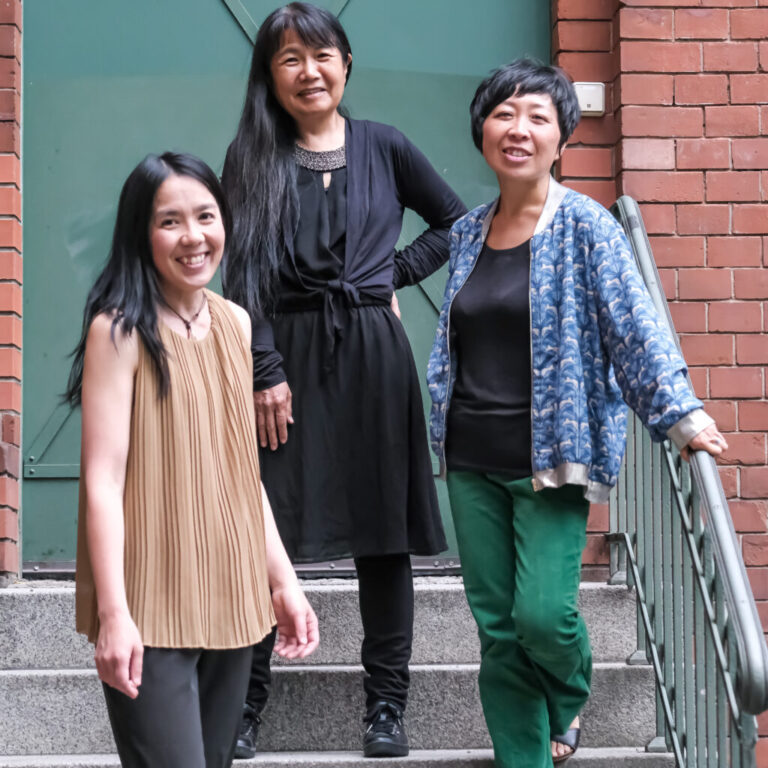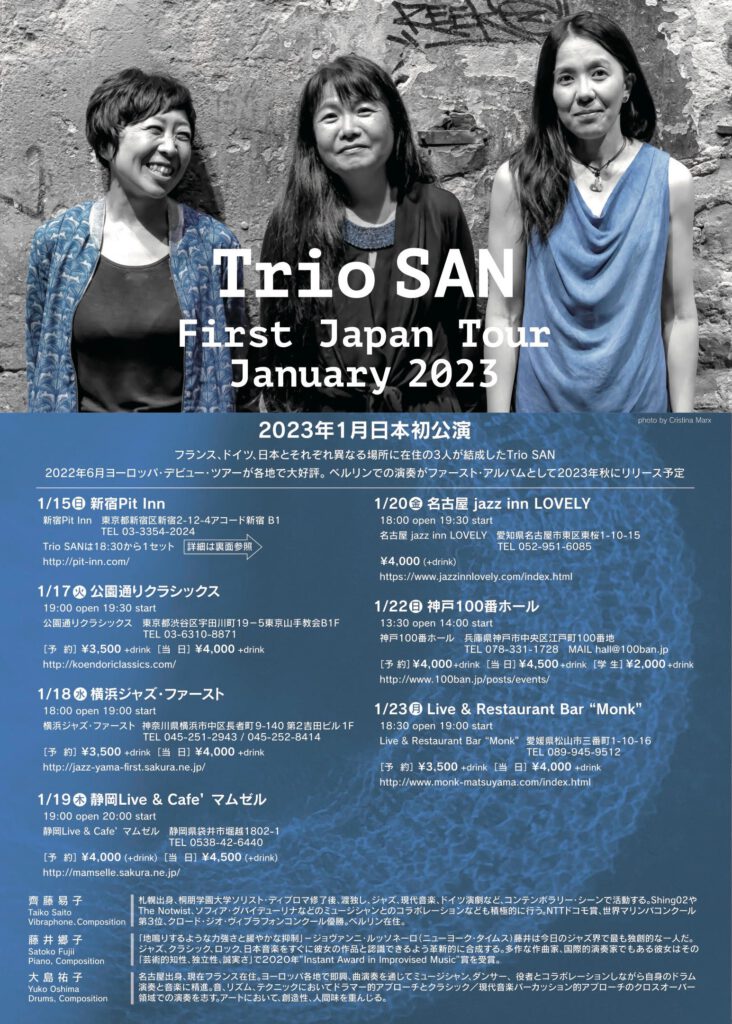Trio SAN

Photo by Cristina Marx
Satoko Fujii : Piano
Taiko Saito : Vibraphone
Yuko Oshima : Drums
Trio SAN is a trio featuring three Japanese musicians who share musicality, sensibility, friendship, but also their roots. Based in three different countries – Japan, Germany, and France, they create music with a global perspective which crosses borders and genres, expanding possibilities. A supple, free, and unbounded soundscape.
reviews:
It all starts with a gentle breeze. But there’s no breeze in this Japanese trio, made up of musicians we’ve become accustomed to hearing in a number of dazzling projects. The light wind of ‘Hibiki’ is carried at first by the broomsticks of drummer Yuko Oshima, who has played with Audrey Lauro and Guillaume Grenard. Little by little, the breath becomes fatter and fatter, weighted down by a piano transformed by the preparations and the interventions at the heart of the guts; a vibraphone responds to it, like a more crystalline double… a chime that flutters and grows in importance as the quest for the elements becomes the central subject of the album. Further on, in ‘Yozakura’, the piano’s dulled timbre becomes one with the drums, while Taiko Saitō’s mallets embody a fine rain, a slow percolation that feeds a growing puddle.
The alliance between Taiko Saitō and pianist Satoko Fujii is well known. In Futari, we find air and water. The ample piano and the mallets that can take on all the states of matter, from evaporation to the most imposing ice. The relationship between Satoko Fujii and Taiko Saitō is very intimate; the two artists speak a common language, that of nature. It’s a complicity we find in the very beautiful ‘What You See’, where the more erratic and contemplative piano welcomes a few light touches from Saitō. The SAN trio knows how to do with the infinitely small, with an astonishing instrumentarium, a classic for Taiko Saitō.
One might have thought that the personality of Yuko Oshima, on the face of it more petulant, might play a spurring role. If the drums designate fire as the missing element in this quest for substance, it does indeed burn in ‘Ichigo’, but also knows how to slowly raise the temperature, warming things up like a winter sun chasing away passing mists. Recorded on the Jazzdor label during a concert in Berlin, Trio San’s Hibiki crowns a group of major artists with uncommon sensitivity. __ Franpi Barriaux, Citizen Jazz
Now Berlin-based, Japanese vibraphonist Taiko Saito divides her time between notated and improvised music with projects as different as Silke Eberhard’s Potsa Lotsa XL and the Sapporo Symphony Orchestra. Part of several combos, these trio sessions show her diverse roles in creative music settings.
Wald links her with bassist Jan Roder and percussionist Michael Griener, two of Germany’s busiest Jazz and improv players, where her vibes take the role that’s usually for a chordal instrument. As part of the Trio San, she adds marimba resonations to her vibraphone mallet forays. Her partners are Strasbourg-based drummer Yuko Oshima, who plays with the likes of Eve Risser, and Tokyo-based pianist Satoko Fujii whose numerous associates encompass Europe, Asia and North America.
Roder’s supple pacing and Grenier’s subtle drum pings on “Ghosts of the Midnight Wood”, Wald’s first track set up the parameters for the trio. Gradually advancing from andante to allegro, Saito’s circular mallet patterning expanded the exposition’s definition so that silent interludes and singular metal bar pops intersect with buzzing bass arco tones and bell-tree shakes from the percussionist that add color as well as rhythm to the process.
This transformation continues throughout, as the aluminum bar and resonator pops provide a softening of the otherwise rhythm section-oriented narratives. Using the pivots from string rubs on the vibes and simple drum clanks and clatters, other pieces emphasize atmospheric shakes or balladic passages. There’s even a point at the end of “Typhoons and Windbreaks” when a walking bass line and drum backbeat combines with the motor-inflected resonator vibration to approximates a standard Blues groove.
Returning to the rhythm section on Hibiki, the vibist lets Fujii be the set’s theme interpretative centre even on the three of the six tunes that the pianist didn’t compose. Emphasized with two handed pressure and energetic connections, the consequence means Oshima’s pacing from cymbals, wood block and drum set strengthens the beat, while shimmers and shivers from vibraphone and marimba provide the bouncing color that completes and softens keyboard expositions.
Interesting enough it’s Oshima’s compositions such as “Wa” which find the piano interpretation at its most technically formal. This also means that here and elsewhere, piano pedal point sets up processional movement alongside aluminum echoes from the vibes before the trio members combine for powerful polyphonic crescendos.
Moving between low and higher pitches, relaxed or rapid expositions, the interlocked set up allows each player to interpret the narratives in a fashion she feels is best. With the energy divided among motifs such as a swirling cloud of vibraphone tinctures, keyboard glissandi or inner piano string strokes and exaggerated press rolls and rattles from the drummer, individual extended techniques eventually affiliate. The blend is so profound in fact that the three can indulge in distinct tropes, as on Fujii’s “Soba” where after moving sections from side to side, the theme is finally revealed in the tune’s last minute. Helped by the cunning extensions and interpolations of her musically erudite associates, Saito’s skills are aptly featured on these discs. –Ken Waxman, Jazzword.com
San – 三 three in Japanese – is the trio of Japanese pianist-composer Satoko Fujii, Japanese, Berlin-based vibes and marimba player-composer Taiko Saito, who collaborates with Fujii in the Futari (two people in Japanese) duo and initiated the San trio, and Japanese, Strasbourg-based drummer-composer Yuko Oshima, who has worked before in a duo with Saito. Hibiki (響, echo or resonance in Japanese, also a name of a famous Japanese blended whiskey) is the debut album of this trio, recorded near the end of a four cities European tour in 2022, and finds the San trio immersed deeply in its own musical world, full of delicate beauty, thunderous energy, and sudden surprises.
San is a collective trio. Fujii, Saito and Oshima wrote music separately, sent their compositional ideas to each other, and discussed the music thoroughly but did not have time to rehearse the music before the first performance of the trio. Fujii concluded that «making sounds means much more than talking about them».
The six pieces stress the organic and multifaceted dynamics of the San trio. Oshima’s title piece opens Hibiki and shapes sound, color, and melody in a collective, subtle and labyrinthine manner while expanding the sonic palette of the trio with an array of personal extended techniques, and gravitating slowly and gently towards a final burst of energy. Saito’s brief «Wa» revolves around a vibes trill that slowly grows in intensity, ornamented imaginatively by Fujii’s dramatic piano playing and Oshima’s punctuating phrases. Saito’s «Ichigo» concludes Hibiki with a rapid, explosive mode that enjoys the improvisational skills of the San trio, as strong-minded soloists and as a tight collective.
Fujii’s «Soba» juggles with a storm of contrasting and resonant sounds and pulses of the piano, vibes and drums. Fujii’s «Yozakura» adds a mysterious, lyrical yet dramatic aroma to the resonant, blending sounds of Saito’s shimmering vibes and Fujii’s rippling piano, colored gently by Oshima’s percussion. Fujii’s last piece for the trio, «What You See», relies on Oshima’s powerful and precise drumming that propels Fujii’s unusual and enigmatic piano timbres and the atmospheric vibes of Saito.
A great trio was born on this tour. __Eyal Hareuvveni, salt-peanuts
…..San takes me on a wonderful journey, with taste buds popping in my ears. Jean-Jacques Birgé, drame.org
